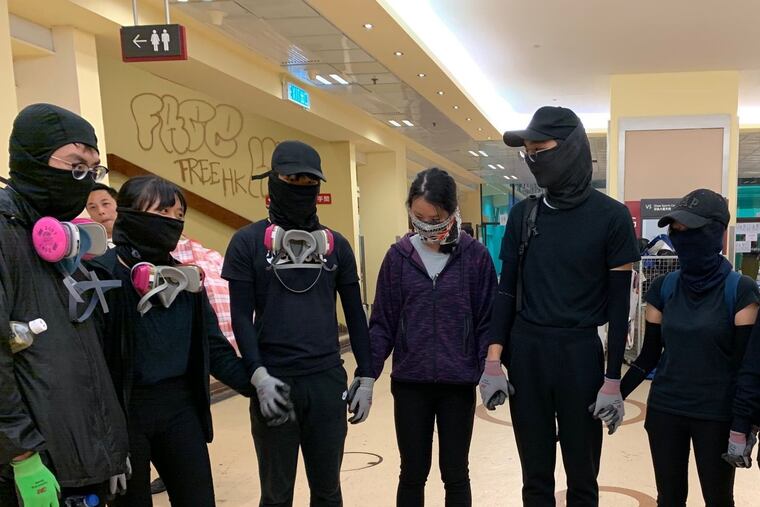‘We need help!’ Young protesters stand up for Hong Kong democracy against enormous odds | Trudy Rubin
Trudy Rubin reports from Hong Kong: High school students in besieged Polytechnic University explain why they're risking their lives for their ideals.

HONG KONG — “We need help!” was the message that flashed on my phone screen Monday morning from 15-year-old Sophie.
More messages followed from a group of Hong Kong high school protesters, ages 15 to 17, whom I had interviewed at Hong Kong Polytechnic University on Saturday, a day before it erupted into a flaming battle between students and police.
Their pleas grew increasingly frantic.
“Please help us. Protesters are surrounded by the police, which are almost everywhere around the university,” wrote Chris (I am using the students’ English nicknames).
“I never thought this would happen in Hong Kong. We just want to help, not to kill.”
The student uprisings are the latest chapter of pro-democracy protests that have been raging for six months, since Hong Kong’s chief executive, Carrie Lam, proposed that Hong Kongers be able to be extradited to China to face trial in courts controlled by the Communist Party.
Under the “one country, two systems” formula China agreed to when Britain returned Hong Kong to China in 1997, Hong Kong is supposed to keep an independent judiciary and a semi-democratic system until 2047. Lam ignored massive peaceful protests against her bill.
She finally withdrew the bill in September, too late to undo the damage. Students had become infuriated by police brutality, and a hardcore group started using violent tactics. The pro-democracy movement demanded that an independent commission be set up to examine police violence against protesters, a demand backed by 80% of the public.
Lam has refused, and is backed by Chinese President Xi Jinping.
The tensions have grown. Several campuses were taken over by students last week after a suspicious death of a student, but most had been evacuated. PolyU, as the university is abbreviated, was turning into the students’ last stand.
Chris, Sophie, and six buddies rushed to PolyU because they’d seen a call for help on a special phone app.
Every entrance to the Poly U campus – a vast concrete plaza surrounded by university buildings – was blocked by furniture, boxes and other debris, with students checking anyone who passed through. The number of student protesters had shrunk to a few hundred, most dressed in black, with black masks over their faces.
But alongside a pedestrian overpass, linked to a university building that overlooks a key traffic tunnel entrance, boxes of homemade gasoline bombs (poured into milk bottles with cloth wicks) sat ready to repel police.
And two students were roaming around with bows and arrows confiscated from the university’s archery club (a policemen was hit by an arrow Monday). There was an air of unreality to the scene.
The group of high school kids were not among the weapons carriers. “We are really scared but we want to protect this place,” said Chris, a skinny, black-clad 17-year-old with glasses, his face covered in black stretch fabric, a pink and black gas mask hanging around his neck.
“All the other universities have fallen. We have to protect the universities, because education represents the future of this city. If we don’t save the universities, the next place police will go will be the secondary school. It is only a matter of time.”
There was a sense, among these kids, that the democracy they prized hung in the balance. They study civics in school in Hong Kong (a subject Beijing wants to see replaced by “patriotic education” praising the Chinese system). They were incensed that Lam was undermining their rule of law.
I asked Sophie, a slight 15-year-old, whether she was ready to go to jail for her beliefs. “No, I am not ready,” she said softly. “ I don’t think we can win, but even so, we still have to fight for our democracy. We don’t want communism.”
Did their parents know they were there? Only one girl said hers knew and gave a green light. Sixteen-year-old Kevin said his parents forbade him, but he went anyway. He left his will at home in case he didn’t return.
There was a sweet naivete about these kids, but also a passionate intensity. Hong Kong has been a place that took rule of law seriously – to the point where everyone fastens their seat belts in rear seats because there is a legal requirement.
The idea that police might shoot a demonstrator was unthinkable here a few months ago, as was the idea a student would throw a petrol bomb at a police van. But Lam’s hard line has convinced many young people here that “one country, two systems” really means the imposition of China’s authoritarian system.
Unless Lam, and Xi, are willing to compromise, the cycle of violence here will continue. So far, the police have rebuffed offers by clerics and legislators to deliver the student holdouts at PolyU to police stations peacefully. They face charges that carry seven- to 10-year jail terms.
I’ve tried to reach Chris and Sophie and the others with no success, although I know they were still in there as of Monday evening, a handful of frightened teenagers standing up for what they believe in against staggering odds.